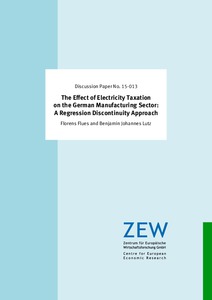The effect of electricity taxation on the German manufacturing sector: a regression discontinuity approach

Flues, Florens ; Lutz, Benjamin Johannes
Zentrum für Europäische Wirtschaftsforschung, Mannheim
ZEW - Mannheim
2015
44 p.
competitiveness ; electricity ; environmental policy ; manufacturing industry ; taxation
Discussion Paper
15-013
Environment
English
Bibliogr.
"Germany taxes electricity use since 1999. The government granted reduced rates to energy intensive firms in the industrial sector for addressing potentially adverse effects on firms' competitiveness. Firms that use more electricity than certain thresholds established by legislation, pay reduced marginal tax rates. As a consequence, the marginal tax rate is a deterministic and discontinuous function of electricity use. We identify and estimate the causal effects of these reduced marginal tax rates on the economic performance of firms using a regression discontinuity design. Our econometric analysis relies on official micro-data at the plant and firm level collected by the German Federal Statistical Office that cover the whole manufacturing sector. We do not find any systematic, statistically significant effects of the electricity tax on firms' turnover, exports, value added, investment and employment. The results suggest that eliminating the reduced marginal electricity tax rates could increase revenues for the government without adversely affecting firms' economic performance."
Digital
The ETUI is co-funded by the European Union. Views and opinions expressed are however those of the author(s) only and do not necessarily reflect those of the European Union or the ETUI.